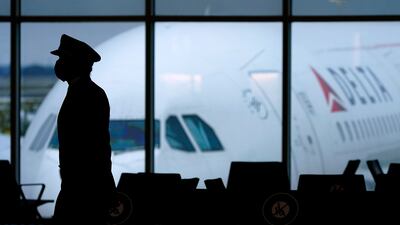More than a third of the world's airline pilots are still not flying for a living – and one in five remain unemployed – as the Covid-19 pandemic continues to take a mental and financial toll on the profession, a survey has found.
A poll of 1,743 professional pilots asking about their work status and attitudes to their career, released on Wednesday, found a slight improvement compared to last year's survey.
The study was carried out by UK-based Goose Recruitment and industry publication FlightGlobal.
The latest poll found 62 per cent of pilots are “employed and currently flying”, up from about 43 per cent a year ago. The proportion of “unemployed” has fallen from 30 per cent to 20 per cent, while six per cent are on furlough, compared with 17 per cent in the previous survey.
“Despite the downbeat mood, it is clear that pilots do look forward to aviation returning to the sort of activity we saw in 2019, sooner rather than later,” said Mark Charman, chief executive and founder of Goose Recruitment.
“Pilots have remained resilient throughout a crisis that has made them adapt to new economic realities and re-evaluate what is important to them in their careers.”
The aviation industry has experienced a mass departure of skilled workers, who left their jobs permanently as airlines were forced to restructure and as government-imposed travel restrictions caused uncertainty. Aviation workers were laid off, furloughed or faced steep pay cuts as the industry grappled with the worst crisis in its history during the two-year pandemic.
The so-called Great Resignation has “hit our industry particularly hard”, Willie Walsh, director general of the International Air Transport Association, said in separate comments during an online press briefing by the industry lobby group on Tuesday.
While 2021 was not marked by the prolonged lockdowns in many parts of the world, unlike 2020, continuing border closures, quarantines measures and other travel restrictions to stem the spread of Covid-19 and its variants have continued to hamper the aviation industry's fragile recovery.
Despite the latest survey showing that prospects for pilots are much better than at the height of the crisis, for many the situation remains bleak.
The poll portrays a profession in which job insecurity is rife, confidence is low and which most pilots would not recommend to young people.
The pandemic has had a serious effect on the profession, mentally and financially, said Sophie Wild, divisional director at FlightGlobal.
“It has been really important to hear from pilots to find out how this crisis has impacted them over almost two years, and how they feel about the future,” she said.
For some out-of-work pilots, the prospect of returning to the cockpit comes with concerns. Almost a quarter of unemployed pilots – 24 per cent – are “not at all confident” about returning to flying, with this rising to four out of 10 in North America, the survey showed.
Mandatory vaccinations for airline crew are a controversial issue. About 68 per cent think double vaccinations should be compulsory for all pilots, although this figure varies considerably by region.
In North America, just 57 per cent believe vaccines should be mandatory, and 20 per cent of pilots there remain not fully vaccinated, despite several airlines making this a condition of employment.
For the industry as a whole, 90 per cent of pilots say they have had two doses of a vaccine.
Despite optimism about industry recovery, 61 per cent of respondents said that they are “concerned” about job security. However, this has improved compared to last year, when 82 per cent said they were worried.
More pilots than last year – 56 per cent now compared with 54 per cent in the previous poll – are considering changing jobs in the next 12 months, "although this could be a sign of an improving jobs market as well as dissatisfaction with current employers", the survey said.
Some 37 per cent of pilots said that, given their time again, they would not have become pilots – slightly up on the 36 per cent who gave this response a year ago.
A majority – 55 per cent – said they would not recommend their career to young people. This has fallen from just 29 per cent of respondents giving this answer two years ago, before the pandemic.
However, the survey does show some silver lining, with 60 per cent of pilots believing the industry will make a full recovery to pre-pandemic levels within two years, and a further 23 per cent saying it will take 12 more months.
The pandemic has had a profound impact on the mental health of aviation workers amid rising levels of uncertainty, stress and anxiety as the crisis hammered air travel demand.
"The Covid-19 pandemic has had a major impact on civil aviation, adversely affecting the mental health and well-being of individuals and groups, whether having been continuously in work, on furlough or returning to work in a ‘new reality’," said Marc Atherton, a registered aviation and occupational psychologist.


